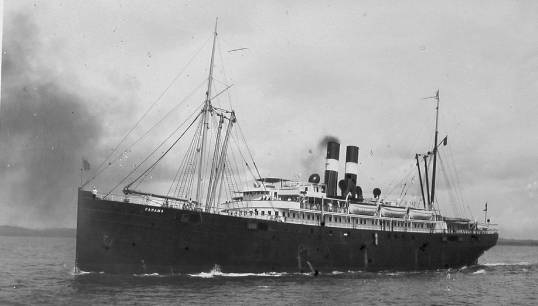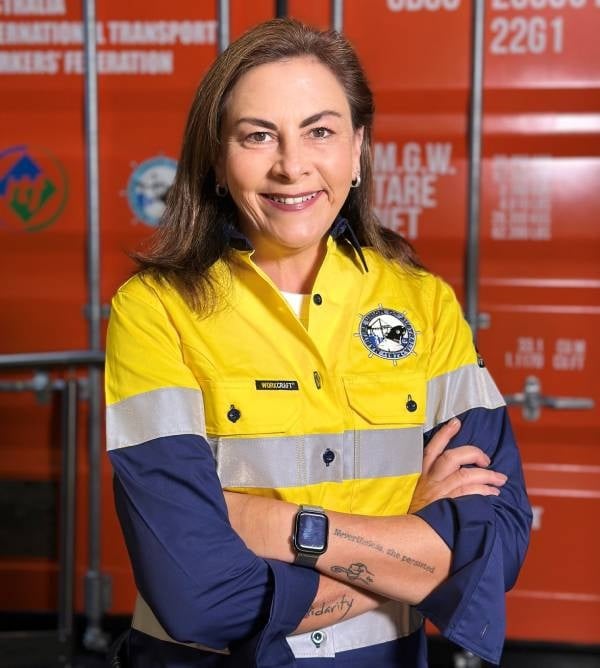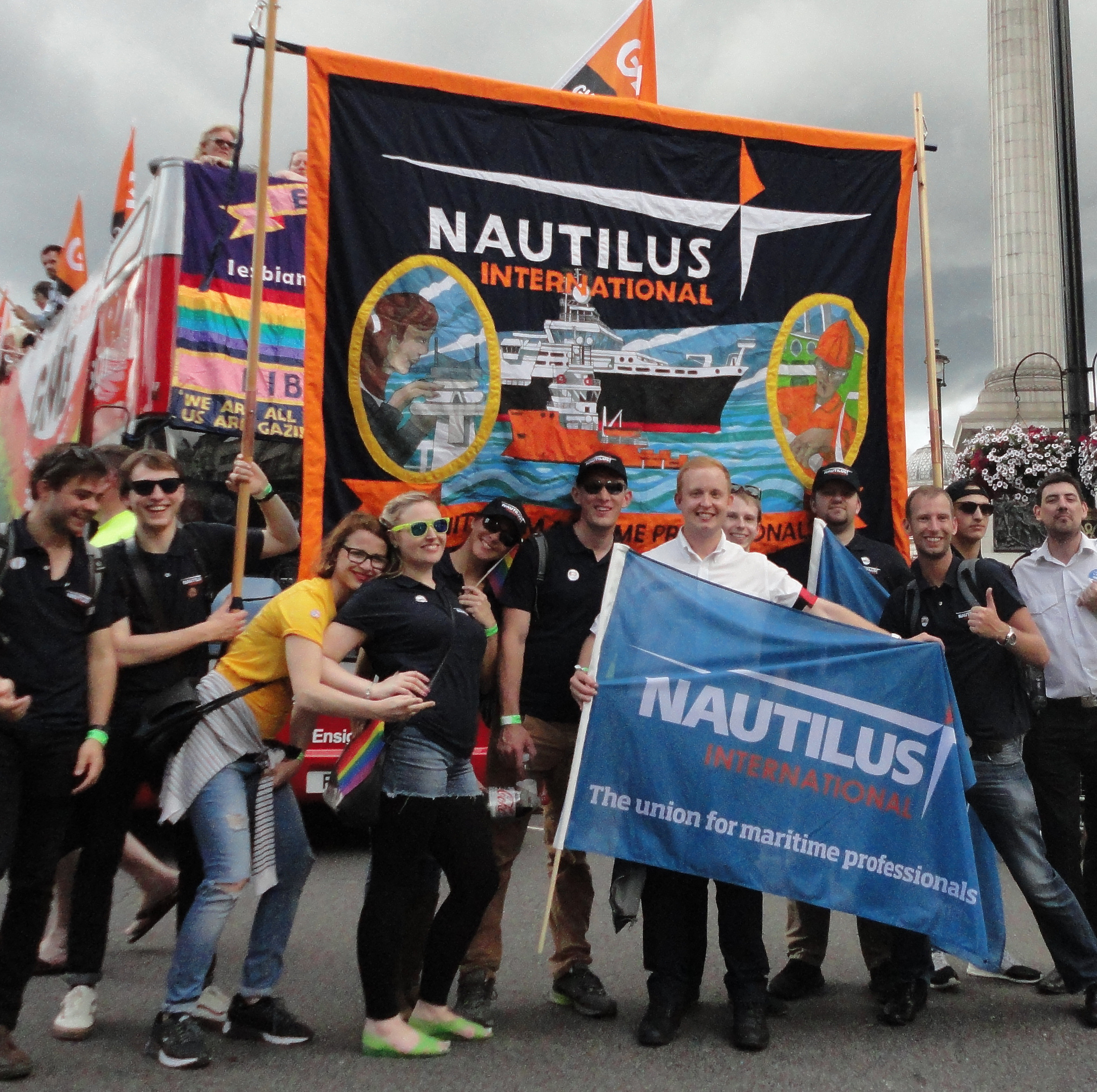- Topics
- Campaigning
- Careers
- Colleges
- Community
- Education and training
- Environment
- Equality
- Federation
- General secretary message
- Government
- Health and safety
- History
- Industrial
- International
- Law
- Members at work
- Nautilus news
- Nautilus partnerships
- Netherlands
- Open days
- Opinion
- Organising
- Podcasts from Nautilus
- Sponsored content
- Switzerland
- Technology
- Ukraine
- United Kingdom
- Welfare

As the UK marks LGBT+ History Month this February, researcher Dr Jo Stanley finds some encouraging historical flickers of support for gay members in 20th century maritime trade unions
Today, members of every union should be able to build on stories of past achievements and heroic figures. But gender and sexual diversity among a union's membership was not something that was valued by policy-makers until recently.
That includes maritime unions, despite some evidence that they were known to have a significant proportion of gay members since the 1950s. Indeed, the records show that at least one union was more likely to support members' fears that 'boys would be harassed by opportunistic paedophiles' than to actively question or work against the pejorative trope.
Informal LGBT+ activism in maritime
The good news is that anecdotal evidence from individuals indicates that there was ad hoc micro-solidarity and justice-seeking on ships.
'He may be queer but he's our queer,' shipmates would say. And they protectively rolled up their sleeves prior to pounding some diversity, equity and inclusion (DEI) lessons into hostile homophobes on foreign wharves.
In dining rooms on P&O liners, stewards exercised workplace power over managers who wanted them to be less flamboyant. 1960s steward Ron Whitworth explained that his head waiter would warn against 'over the top' eyeshadow. 'He knew what he was up against,' explained Ron. 'He couldn't say much really. If he'd said, "Don't dare come in like that," everybody would have revolted and done it all the more – just to show him who was the boss.'
Mixed fortunes for gay crew
Dismissals of union members for alleged 'homosexuality' were a major reason for some UK unions taking 'gay rights' seriously in the 1960s – notably at the local government workers' union NALGO.
There is little evidence of such activity in maritime unions, but arguably union support was less necessary because shipping employers were the least likely of all to sack LGBT+ ratings, due to gay men's perceived excellence in roles such as stewards.
By contrast, Merchant Navy officers stayed closeted, because senior men had to be seen as morally unimpeachable, meaning heterosexual. No such MN dismissal accounts ever reached the media, law courts, or pages of union publications.
Looking at these crew members' military counterparts, homosexuality was dealt with quietly but firmly in the ultra-sensitive Royal Navy of the 1960s, through dismissals and 'early retirements'. The armed forces are not unionised, but concerted effort to defend homosexual rights in the RN began in 1991 with the organisation Rank Outsiders, for which individuals volunteered unpaid.
LGBT+ union activism outside the UK
USA: The most effective DEI work in a maritime union happened in the National Union of Cooks and Stewards in the 1930s and 1940s. Uniquely embracing diversity, its slogan was 'No Red-Baiting, No Race-Baiting, No Queen-Baiting!'
Official Frank McCormick (1891-1980) deserves acclaim as the world's foremost LGBT+ maritime union activist. A steward and 'female impersonator', in the 1920s Frank had been discharged from the US Navy for a homosexual act he hadn't committed.
Not only did he become a leader of his union, but his life partner Stephen Blair was active in the union too. Stephen, a steward, had been a ship's delegate on the steamship Aleutian until in 1936 he was sacked for 'homosexuality'.
The Pacific-focused union flourished, not least because it had so many black members. However, it folded in the 1950s, mainly because of the 1947 Taft-Hartley Act and racism.
Australia: Back in the 20th century, a Sydney official of the Seamen's Union of Australia once said:

'We'd follow the slogan of the American Navy – "Don't ask, and you won't be told".'
The Maritime Union of Australia became a more visible supporter of LGBT+ rights when in 2016 it began to support marriage equality. Leading the way was Mich-Elle Myers.
A former stevedore, she is now assistant national secretary of the MUA and vice-president of the Australian Labor Party.
Main sources
Marine Cooks and Stewards, Waterfront Workers History Project, Harry Bridges Center for Labor Studies, University of Washington
'No Red-Baiting, No Race-Baiting, No Queen-Baiting!': The Marine Cooks and Stewards Union from the Depression to the Cold War, by Allan Bérubé
Gay American History, by Jonathan Ned Katz
'We Took Care of Each Other': A Maritime Union's Hidden History of Gay-Straight and Interracial Solidarity, by Jonathan Kissam, from the labornotes.org blog
- Dr Jo Stanley's groundbreaking book Hello Sailor! The hidden history of gay life at sea is available in the Nautilus Bookshop.

Become an LGBT+ activist at Nautilus
Past issues of the Telegraph show some interest in LGBT+ activism from members of the Nautilus predecessor union NUMAST in the 1990s. However, it was not until the 2010s that momentum started to build, and in 2016 a delegation from Nautilus attended the Pride in London march for the first time.
We now have a Pride movement at the Union, and we were among the first organisations to adopt 28 February as Pride in Maritime Day, alongside the Pride in Maritime Network of Maritime UK.
Our Pride movement comes under the umbrella of the Nautilus Equality and Diversity Forum. Whether you're an LGBT+ maritime professional or an ally, why not join us at the next Forum meeting in April?
Nautilus Equality and Diversity Forum
10 April 2025
10.00-11.30 BST
Online meeting
Nautilus members will receive an email invitation to the Forum, and can also sign up via www.nautilusint.org/events

Join Nautilus International!
Be part of the union for maritime professionals
Wherever you are, so are we
We are the voice of maritime professionals, at sea and ashore. We have a say on all the major issues affecting our members.
✓Certificate protection
✓Legal assistance
✓Dispute resolution
Tags
